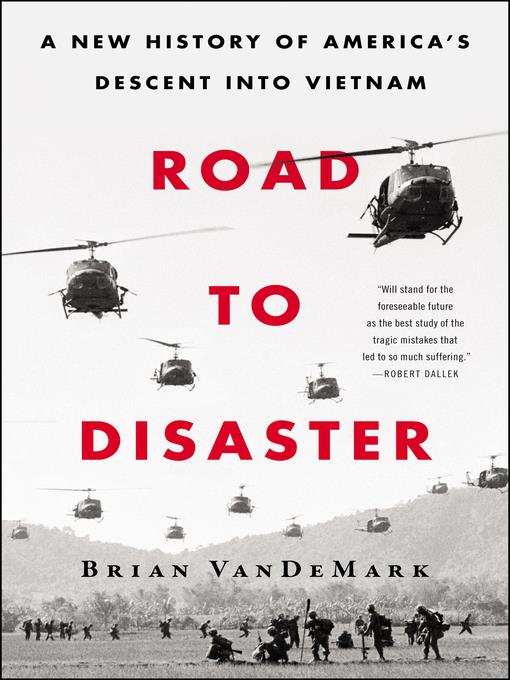
Road to Disaster
A New History of America's Descent into Vietnam
کتاب های مرتبط
- اطلاعات
- نقد و بررسی
- دیدگاه کاربران
نقد و بررسی

May 15, 2018
Research assistant on Clark Clifford's Counsel to the President and coauthor of Robert McNamara's No. 1 best-selling In Retrospect, VanDeMark, who teaches history at the U.S. Naval Academy, seems well placed to consider how the smart young men of the Kennedy and Johnson administrations got so much so wrong.
Copyright 2018 Library Journal, LLC Used with permission.

July 15, 2018
When good people make bad decisions, millions die.VanDeMark (History/U.S. Naval Academy; American Sheikhs: Two Families, Four Generations, and the Story of America's Influence in the Middle East, 2012, etc.), who co-authored Robert S. McNamara's memoir In Retrospect, takes a hard look at the flawed decision-making that figured in America's misadventures in Southeast Asia. Usefully, he forges strong connections between Vietnam policy and efforts to contain communist expansion elsewhere in the world, particularly Cuba. The U.S. defense strategy that informed responses to the Cuban missile crisis and the Bay of Pigs was much in evidence on the other side of the world. That military doctrine, writes the author, was too often based on imperfect information, to say nothing of a certainty of American right; the decision-makers, too, "had not gotten to where they were by being iconoclasts or troublemakers" but instead supported each other in error. It came as a surprise to all those company men that when, in 1966, America stepped up its bombing campaign, communist infiltration actually increased. VanDeMark turns in some surprising observations that indicate that some of those involved were uneasy about their assumptions and the consequences of them. For instance, Lyndon Johnson admitted after the fact that he should have brought in his own advisers to replace John F. Kennedy's and to rethink the situation, while McNamara retreated from his technocratic approach to the conduct of the war and came to see it as a mistake. "Ironically," writes the author, "the man who had sought a precise metric for each situation could only measure his legacy by that most plaintive and nebulous claim that it 'could have been worse.' " Recognizing the limitations and human failings of strategists in Vietnam, VanDeMark closes by offering pointed lessons for modern war planners on such matters as "harnessing cognitive diversity" and favoring long-term thinking over short-term expedients.A fresh but sobering approach to the disastrous war in Vietnam, of considerable interest to all students of military history and policy.
COPYRIGHT(2018) Kirkus Reviews, ALL RIGHTS RESERVED.

Starred review from July 23, 2018
VanDeMark, a historian specializing in the Vietnam War, investigates at length how and why the Kennedy and Johnson administrations made the decisions that set the course of the Vietnam War. Drawing from numerous, in some cases exclusive, primary and secondary sources, he all but tells his story through defense secretary Robert S. McNamara’s eyes, giving the reader innumerable details about the former Ford executive’s war planning processes, his trips to Vietnam, meetings with Johnson and the national security team, bitter battles with the Joint Chiefs and other military brass, and his painful disillusionment after realizing in November 1967 that the war effort he oversaw was doomed. By not speaking out to the president or publicly for years, McNamara, VanDeMark writes, “effectively placed loyalty to the presidency above loyalty to the national interest” and “implicitly, if unintentionally, supported the continuation of a disastrous war that claimed” hundreds of thousands of lives. Throughout, VanDeMark brings in the work of social scientists—decision and negotiation researchers, sociologists, cognitive researchers, psychologists, behavioral economists, and others—to illuminate McNamara’s decision-making processes. Some of their ideas, such as the sunk cost fallacy, clearly apply; others, including the Ikea effect, which reputedly causes people to overvalue things they have contributed to making, seem less relevant. This book is sure to appeal to those still searching for Vietnam War answers that even McNamara, Johnson, and their best and brightest advisers never found.

























دیدگاه کاربران